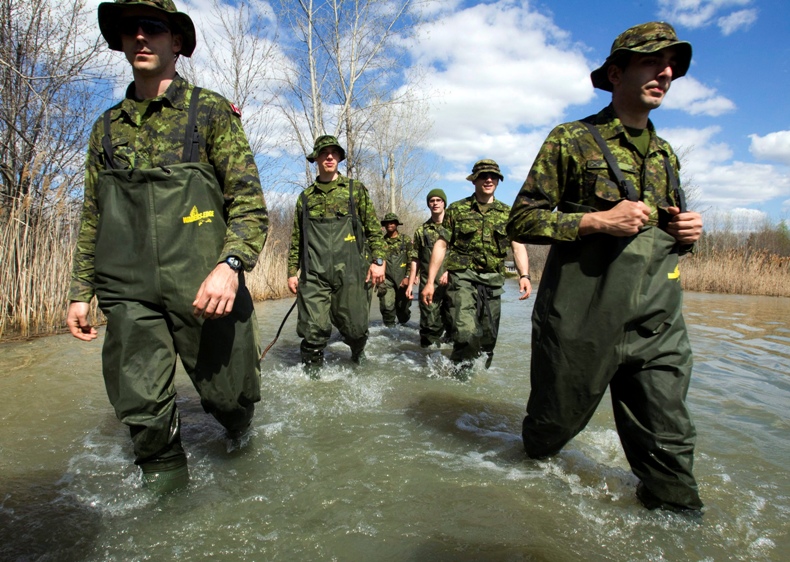As the city of Fort McMurray stood nearly empty and burning on Wednesday morning, Canada’s defence minister confirmed that the military has been called in and is preparing to help in whatever way it can.

Harjit Sajjan told reporters on a conference call from Germany that an official request for help has been made by the province of Alberta, which was a necessary step before a major military operation could be launched.
READ MORE: In-depth coverage of the Fort McMurray wildfire
Sajjan is in Germany for a security conference, and said he is being updated on the situation in Fort McMurray as it unfolds.
“Before I left, I was briefed by my staff and I spoke with (Public Safety) Minister Ralph Goodale about this,” Sajjan said. “I assured him that all assets will be available. I’ll be briefed up as soon as I finish this call.”
WATCH: ‘I understand my own home is in flames,’ says Wildrose Leader Brian Jean

Experience with previous disasters and training exercises have made a rapid response to the crisis easier, Sajjan added.
“A lot of the aspects of the coordination were done very quickly.”
What will the soldiers do?
In a conference call early Wednesday afternoon, Brig.-Gen. Wayne Eyre, Commander of Joint Task Force (West), confirmed that several military resources were on-standby or already deployed. Eyre is the top commander in charge of the military response.
Hercules aircraft are waiting on standby at Canadian Forces Base Trenton to deploy to the region if help is needed to evacuate people, transport equipment or transport firefighters, he said. Another Hercules aircraft has been “pre-positioned” even closer to Fort McMurray in Cold Lake, Alberta.
Specifically, said Eyre, Alberta’s government has asked for:
- Assistance for municipal and provincial authorities who are helping people in distress
- Assistance in evacuation of residents in isolated areas affected by the fire
- Assistance in the transportation of equipment and personnel to isolated areas to fight the fire
A number of CH-146 Griffon helicopters have also been sent to Fort McMurray, the general confirmed, and they landed on Wednesday morning.
As of Wednesday, soldiers are not being trained or deployed to actually fight the fires, as they have in the past.
“We are the force of last resort … we come in when other civilian resources are exhausted,” Eyre explained. “As always, we are poised to provide further support should the ask come.”
Fort McMurray wildfire: Map of neighbourhoods affected
Global News confirmed Tuesday evening that military personnel in the region had already received notice that they should be ready to deploy. Army reserves “are standing by should the call come,” said Eyre.
Past disasters
Major domestic disasters sometimes necessitate intervention from the Canadian Forces, which have the equipment and personnel to respond to situations involving widespread evacuations, heavy damage to property and even loss of life.
Depending on the situation, the closest military bases to whatever disaster is unfolding are the ones that normally provide the troops.
There are some restrictions to what these soldiers can do, according to the Department of National Defence. Relief efforts from the military cannot disrupt ongoing operations or search and rescue operations.
In the spring of 2011, the military was called in at the request of the government of Quebec as severe flooding struck several municipalities in the province’s Monteregie region. In that situation, 500 soldiers helped to fill out sandbags, distribute food or water to displaced residents, protect infrastructure and evacuate people who were trapped in their homes.
WATCH BELOW: Fort McMurray fire update: Blazing heat, strong wind expected to hinder emergency crews

Fires have often necessitated even more direct participation from the military. In the summer of 2003, the forces launched Operation Peregrine — the third-largest domestic operation ever — to help British Columbia deal with hundreds of raging forest fires.
Hundreds of soldiers were given basic firefighting training and actually deployed to the front of the fire lines to battle the blazes.
Then, just last year, soldiers were once again called into action during the wildfires in Saskatchewan. Again, they received a day of training before heading out to support firefighters already on the ground, patrolling the fire lines, putting out hot spots and providing logistical support wherever possible.
Prime Minister offers support
Prime Minister Justin Trudeau confirmed on Wednesday morning that he had spoken to Alberta Premier Rachel Notley. He called it a “terrible time” for the people of Fort McMurray.
“We will be there for them,” Trudeau said. “We are a country of people who support each other and we will continue to do that, particularly in situations such as this.”
Trudeau was asked about making a direct link between climate change and the fires raging in Alberta. He said that although it’s been proven that more severe weather events are to be expected as the planet warms, it would not be responsible or “helpful” to draw a direct line between the Fort McMurray blaze and global warming.
If you would like to help the people of Fort McMurray, text REDCROSS to 30333 to make a $5 donation or visit redcross.ca to make a donation online.




Comments